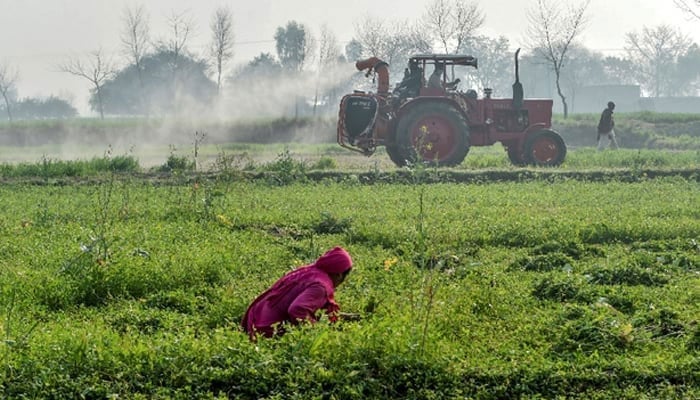Inclusive agriculture
By empowering peasants and landless individuals, Pakistan can unlock its full agricultural potential
Pakistan’s underperforming agricultural sector employs approximately 39 per cent of the workforce and contributes 24 per cent to the national GDP, according to the Pakistan Economic Survey 2023-24.
Despite its critical role, the sector remains severely underproductive, plagued by systemic corruption, mismanagement, inadequate planning and inefficient resource utilisation. These challenges are particularly pronounced in Sindh and Punjab, which together account for over 70 per cent of Pakistan’s agricultural output.
Addressing these issues requires a transformative approach that prioritises the empowerment of peasants and landless individuals over corporate interests. The constitution of Pakistan, particularly Article 9, which safeguards the right to life and a dignified existence, mandates the government to ensure inclusive development and shared prosperity.
The essence of Pakistan lies in the lives, hopes, and dignity of its citizens. Ignoring their struggles while focusing solely on macroeconomic figures that benefit only a privileged few is not just misguided but deeply unjust and even criminal. Such an approach is not only anti-people, but ultimately anti-Pakistan.
Peasants and landless labourers in Sindh and Punjab face deep-rooted structural marginalisation, with over 70 per cent of agricultural workers owning little or no land, making them highly vulnerable to exploitation by large landowners and corporate interests. In Sindh, a mere 2.0 per cent of landowners control nearly 45 per cent of arable land, while small farmers in Punjab struggle with limited access to credit, inputs and irrigation.
Systemic corruption, particularly in the distribution of agricultural subsidies, further entrenches inequality, as resources are often diverted to the powerful elite. Combined with inefficient water management – 30–40 per cent of irrigation water is lost to seepage – and a lack of meaningful land reform, these issues severely constrain productivity and demand urgent, transformative action over superficial solutions.
The constitution provides a robust framework for protecting the rights of marginalised communities. Article 9 guarantees the right to life, which the Supreme Court of Pakistan has interpreted to include access to livelihoods, food security and a dignified existence.
Article 38 further mandates the state to promote social and economic well-being by reducing disparities in income and opportunity. These provisions impose a constitutional duty on the government to prioritise inclusive agricultural development over exclusionary, corporate-driven models.
However, recent initiatives raise serious concerns such as the allocation of large tracts of public land in Sindh to corporate entities for agribusiness ventures.
Decisions made without transparent public consultation risk displacing local farmers and violating their constitutional rights. A 2023 Oxfam Pakistan briefing criticised corporate farming initiatives for prioritising profit over people, leading to land concentration, reduced food security, and environmental harm. The Sindh government’s disregard for citizens’ rights raises serious concerns about the competence of its legal advisors, who must ensure constitutional compliance. While modern technologies like precision agriculture, drip irrigation, and climate-resilient crops are essential for transforming Pakistan’s agriculture, progress must not come at the expense of peasants.
Evidence from a 2022 FAO study shows drip irrigation improved water efficiency by 50 per cent and increased yields by 20 per cent on Punjab’s small farms, while PARC’s 2023 report highlights that hybrid seeds have boosted cotton and wheat output in Sindh. Empowering peasants to adopt these technologies requires targeted interventions.
First, the government must expand access to affordable credit. The State Bank of Pakistan’s 2023 data (not verifiable and not transparent) shows that only 15 per cent of small farmers receive formal credit, forcing many to rely on exploitative informal lenders. Subsidised loan programmes, tailored to landless and smallholder farmers, can bridge this gap.
Second, extension services must be strengthened. A 2021 PIDE study revealed that only 10 per cent of farmers in Sindh and Punjab receive regular agricultural extension support, limiting their exposure to modern techniques. Establishing community-based training centres can address this shortfall.
Third, land reforms are critical for addressing inequality and boosting agricultural productivity in Pakistan. The 1977 Land Reforms Act, which capped landholdings at 100 acres of irrigated land and aimed to redistribute surplus land, was stalled by General Ziaul Haq’s 1979 ordinances favouring feudal elites and a 1989 Shariat Court ruling that deemed the reforms’ ceilings un-Islamic, reverting Pakistan’s land framework to 1947.
The recent allocation of public land to corporate interests raises serious concerns about deepening inequality and rural displacement. A 2023 SDPI study highlights that corporate farming in Pakistan tends to prioritise export crops over local food needs and often excludes local labour through mechanisation, threatening the livelihoods of traditional farmers, especially in Sindh, where 60 per cent of rural households rely on agriculture. These initiatives, pushed forward without public consultation, violate participatory governance norms and legal protections like the Sindh Tenancy Act of 1950. As a result, grassroots movements such as the Sindh Hari Committee are mobilising to demand justice, transparency and inclusive agricultural policies.
To achieve sustainable and inclusive agricultural growth, the government must prioritise the following actions: one, implement land reforms: redistribute public land to landless peasants and enforce tenancy rights to ensure security of tenure. Two, enhance access to inputs: subsidise seeds, fertilisers and irrigation technologies for smallholder farmers, with strict oversight to prevent elite capture.
Three, strengthen extension services: deploy mobile training units to educate farmers on modern techniques, focusing on climate resilience and resource efficiency. Four, promote cooperative models: establish farmer cooperatives to improve bargaining power and market access, as demonstrated in Punjab’s dairy sector.
Five, ensure transparency: mandate public consultation and environmental impact assessments for all agricultural investment projects. Sex, ensure that every agricultural university, government department and research institute actively engages with farmers on the ground – reaching every field, every village and every grower – with the clear mission of transforming each plot of land into a hub of high productivity and sustainable growth.
These measures are constitutional obligations under Articles 9 and 38, which mandate the protection of fundamental rights and equitable distribution of resources. True development must uplift all segments of society, not just serve the interests of a privileged few. By empowering peasants and landless individuals, Pakistan can unlock its full agricultural potential while building a more just, inclusive and prosperous future for all.
The writer is an advocate of the high court and a former civil servant.
-
 Chris Hemsworth Gets Candid About Daughter’s Drawings That Inspired Several Of His Tattoos
Chris Hemsworth Gets Candid About Daughter’s Drawings That Inspired Several Of His Tattoos -
 UK To Experience Rare 'Blood Rain' On Tuesday Feb. 24, 2026: Know Every Detail
UK To Experience Rare 'Blood Rain' On Tuesday Feb. 24, 2026: Know Every Detail -
 Maria Shriver Shares Heartbreaking Reminder After Eric Dane's Death: 'Next Week Isn't Guaranteed'
Maria Shriver Shares Heartbreaking Reminder After Eric Dane's Death: 'Next Week Isn't Guaranteed' -
 Andrew Mountbatten Windsor Gets New Moniker After Losing ‘Prince’ Title
Andrew Mountbatten Windsor Gets New Moniker After Losing ‘Prince’ Title -
 Jack Black Shares Unseen Moments With Tanya Haden: 'My Love'
Jack Black Shares Unseen Moments With Tanya Haden: 'My Love' -
 Shamed Andrew Made Taxpayers Fund Personal ‘massages’
Shamed Andrew Made Taxpayers Fund Personal ‘massages’ -
 What Could Be Nick Reiner's Fate After Pleading Not Guilty Parents’ Murder Case?
What Could Be Nick Reiner's Fate After Pleading Not Guilty Parents’ Murder Case? -
 Princess Kate Talks About 'hard Conversations' With Kids Amid Andrew Drama
Princess Kate Talks About 'hard Conversations' With Kids Amid Andrew Drama -
 Prince William Mocked For Being ‘most Reluctant’ King-in-waiting
Prince William Mocked For Being ‘most Reluctant’ King-in-waiting -
 Prince William Makes Rare Admission After Andrew Arrest
Prince William Makes Rare Admission After Andrew Arrest -
 ‘Got A Lot Of People Gunning For Me’: Trump Makes First Comments On Mar-a-Lago Intruder
‘Got A Lot Of People Gunning For Me’: Trump Makes First Comments On Mar-a-Lago Intruder -
 What Countries Have A Say In Andrew Removal From Line Of Succession?
What Countries Have A Say In Andrew Removal From Line Of Succession? -
 How Did Luci4 Die? Police Probes 'BodyPartz' Sudden 'suspicious' Death
How Did Luci4 Die? Police Probes 'BodyPartz' Sudden 'suspicious' Death -
 King Charles Criticized By Princess Anne Over Andrew Drama
King Charles Criticized By Princess Anne Over Andrew Drama -
 Kelly Osbourne Hits Back At 'absolutely Devastating' Body Shaming Comments
Kelly Osbourne Hits Back At 'absolutely Devastating' Body Shaming Comments -
 Hailee Steinfeld Details Preparations Ahead Of Welcoming First Kid With Josh Allen
Hailee Steinfeld Details Preparations Ahead Of Welcoming First Kid With Josh Allen




